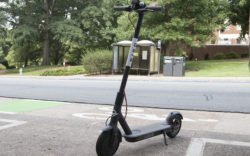Whether or not they meet the county’s legal requirements, some ACC dog owners have installed underground fences that shock a dog through an electronic collar if it tries to leave its yard. But “wireless” or “radio” fences aren’t as effective as traditional fences in some ways—the collar’s batteries can die, the dog can charge past the buried signal wire regardless, and they don’t prevent other animals or children from entering the yard.
But last week, ACC commissioners voted 8-2 to legalize electronic fences, and nixed a proposed requirement that the owner must be present. Owners of electronic fences must now post signs so the public will know that the fence exists, and “dangerous” dogs that have killed or injured another dog or cat in the past will still have to be confined using a physical fence.
The discussion was civil, but the issue, like any involving animals, was controversial. A parade of dog owners defended electronic fences—no one spoke against them—as being effective, humane, less unsightly and less expensive than conventional fences. Valerie Dickey told commissioners that her dogs can jump or dig out of a conventional fence. “My one dog can clear eight feet, just by jumping,” she said, and a chain-link fence with a concrete footing could cost $15,000 to build. Her electronic fence has kept her three dogs confined for the past four years with no problems, she said.
Terry Osbolt, who installs such fences professionally, said he guarantees them to keep dogs in, and not one of his 2,000 installations has failed. The dogs require a little training, he said, but “after three or four days, the dogs don’t get any more zaps. They know better.”
But that wasn’t Commissioner Andy Herod’s experience. “We had an electronic fence, and that was the worst expenditure of money I’ve made in a long time,” he said. “We put it around a pond. If the dogs wanted to get in the pond, the electronic fence didn’t make any difference whatsoever.” The issue only came up, Herod added, after a Municipal Court decision declared the fences legal. Herod was “baffled” by that ruling, he said; the law “very clearly” requires fences to keep other dogs or people out, and electronic fences can’t do that. “Electronic fences have always been illegal in Clarke County,” he said.
But other commissioners were unpersuaded, or felt it was too much to ask dog owners to always be present when an electronic fence is in use. The change will be evaluated in one year.
In addition, commissioners approved a new historic district covering the block of West Rutherford Street between Stanton Way and Mt. Vernon Place. This will be the county’s 13th local historic district (including the core of downtown) and will provide protection to “an outstanding collection of historic homes,” strongly discouraging any demolitions and requiring approval for significant exterior design changes. Athens-Clarke Heritage Foundation director Amy Kissane said involved homeowners had “driven” the process, which will extend the protected West Cloverhurst district.
In other business:
• The coming year’s work plan was approved for the commission’s independent internal investigator, known as the “Office of Operational Analysis.” The analyst’s office will complete its performance review of the Leisure Services Department and will review all county departments and agencies to determine where to focus future investigations.
• The commission approved reimbursement for UGA for students and employees to ride city buses for free (some million rides annually) at the rate of $1.42 per ride (or half that if the ride is within campus) totaling almost $700,000 to the county.
• Manager Blaine Williams announced a new monthly publication called Snapshot to update citizens on projects and initiatives of the local government.
Like what you just read? Support Flagpole by making a donation today. Every dollar you give helps fund our ongoing mission to provide Athens with quality, independent journalism.










